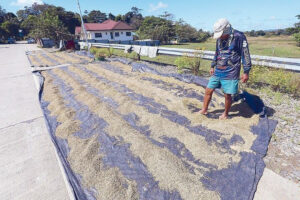Amid peso depreciation: Medalla vows to ‘act decisively’

THE BANGKO SENTRAL ng Pilipinas (BSP) on Wednesday said the peso depreciation has been fueling inflationary pressures, adding that this strengthens the case to “act decisively.”
The Philippine peso closed at P58.965 against the dollar on Wednesday, losing 10 centavos from its P58.865 finish on Tuesday. This is just 3.5 centavos away from the local currency’s record close of P59 on Oct. 10.
“The BSP does not normally react too much to movements in the exchange rate in keeping with our market-determined exchange rate policy. We view such moves as healthy market adjustment that sets appropriate signals to producers and consumers,” BSP Governor Felipe M. Medalla said during a virtual convention hosted by the Chamber of Thrift Banks on Wednesday.
“But the peso depreciation, while remaining in line with regional peers, has been adding to the buildup of inflationary pressures. This strengthens the case (for us) to act and to act decisively,” he added.
The BSP earlier said financial markets around the world have been disrupted by the strong US dollar, which has caused other currencies such as the peso to depreciate.
For the year so far, the peso has weakened by 15.6% or P7.965 from its P51 close on Dec. 31, 2021.
Headline inflation quickened to 6.9% in September after easing slightly to 6.3% in August from 6.4% in July. In the nine months to September, inflation averaged 5.1%.
Mr. Medalla noted inflation will likely exceed the central bank’s 2-4% target band this year and in 2023.
“But as our rate hikes kick in, remember our tools act with a six-to-18-month lag, inflation for the second half of 2023 will likely be closer to 3% than to 4%. With full-year averaging slightly above 4.1%… We might slightly miss our headline target of 4%,” he said.
The BSP expects inflation to ease to 3% by 2024, Mr. Medalla added.
The Monetary Board has hiked borrowing costs by 225 basis points (bps) so far this year, in a bid to cool inflation.
“Our policy settings remain accommodative. Real policy rate is still quite low. Achieving a target consistent path of inflation is of paramount concern to us,” Mr. Medalla said.
‘SPECULATIVE ACTIVITIES’Meanwhile, the Bankers Association of the Philippines (BAP) said on Wednesday it will work with the BSP to fight “speculative activities that tend to distort market prices and hurt the economy.”
“With global headwinds adversely affecting inflation and foreign exchange rates across the world, the BAP joins national efforts to minimize its impact on our people by avoiding activities that can only worsen the situation,” BAP President Antonio C. Moncupa said in a statement.
“In order to be part of the solution, the banking industry continues to work closely with the BSP for orderly, fair, and transparent markets minus the unproductive activities that only hurt the public,” he added.
UnionBank of the Philippines, Inc. Chief Economist Ruben Carlo O. Asuncion welcomed the BAP’s statement, saying this is a step in the right direction.
“Although it is widely expected that the BSP should allow market forces to move by itself, it is good to forge a stronger partnership with the market like the way various ASEAN (Association of Southeast Asian Nations) countries in the past have worked together to prevent financial market stress that can be detrimental for everyone,” Mr. Asuncion said in a Viber message.
“I have seen this cooperation among ASEAN countries and cooperation within these economies should also be a welcome development especially during uncertain times,” he added.
The peso opened Wednesday’s session at P58.95 versus the dollar. Its weakest showing was at P58.999, while its intraday best at P58.888 against the greenback.
Dollars exchanged inched down to $505.37 million on Wednesday from $642.35 million on Tuesday.
“The peso weakened amid hawkish remarks by Fed official Mester and global slowdown concerns due to rising (coronavirus) cases in China,” a trader said in an e-mail.
Federal Reserve Bank of Cleveland President Loretta J. Mester on Tuesday said the US central bank has yet to tame surging inflation and will continue to tighten monetary policy.
The Fed has raised interest rates by 300 bps since March.
“The local currency might depreciate ahead of potentially elevated US consumer inflation reports,” the trader said.
For Thursday, the trader gave a forecast range of P58.90 to P59. — Keisha B. Ta-asan




